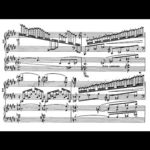Moritz Moszkowski – Piano Concerto In E Major, Op. 59, Markus Pawlik (piano), Polish National Radio Symphony Orchestra, Antoni Wit (conductor)
1. Moderato – 00:00
2. Andante – 12:54
3. Scherzo: Vivace – 21:44
4. Allegro deciso – 29:00
The Piano Concerto No. 2 in E Major, Op.59, was composed in 1898. It is considered to be one of the most extraordinary works of the Romantic Era. It was dedicated to Josef Hofmann, a player who was to become one of the greatest piano virtuoso of all time.
Moritz (Maurice) Moszkowski (23 August 1854 – 4 March 1925) was a German-Jewish composer of Polish descenton his paternal side, pianist, and teacher. His brother Alexander Moszkowski was a famous writer and satirist in Berlin.
He showed early talent from a very tender age, beginning his musical training at home until 1865, when his family moved to Dresden. There he continued his piano studies at the conservatory. He moved to Berlin in 1869 to continue his studies first at the Julius Stern’s Conservatory, where he studied piano with Eduard Franck and composition with Friedrich Kiel, and then at Theodor Kullak’s Neue Akademie der Tonkunst, where he studied composition with Richard Wüerst and orchestration with Heinrich Dorn. There he became close friends with the Scharwenka brothers, Xaver and Philipp. In 1871 he accepted Kullak’s offer to become a teacher in his academy; as he was also a more than competent violinist, he sometimes played first violin in the orchestra.
In 1873 Moszkowski made his first successful appearance as a pianist, and soon began touring the nearby cities in order to gain experience and establish his reputation. Two years later he was already playing his piano concerto on two pianos with Franz Liszt at a matineé before a selected audience invited by Liszt himself. Moszkowski then travelled successfully throughout Europe with the reputation of being an exceptional concert pianist and brilliant composer, having also gained some recognition as a conductor.
Despite the balance and bright limpidity of his playing and his wonderful technique, which aroused the enthusiasm of admirers throughout Europe, his music has also been described as “devoid of the masculine and the feminine”. He was a master in his pianistic repertoire, but it was in his own compositions that he was more admired. His music rapidly became a sensation, but he also had legitimate success in major works for the stage and the concert hall.




